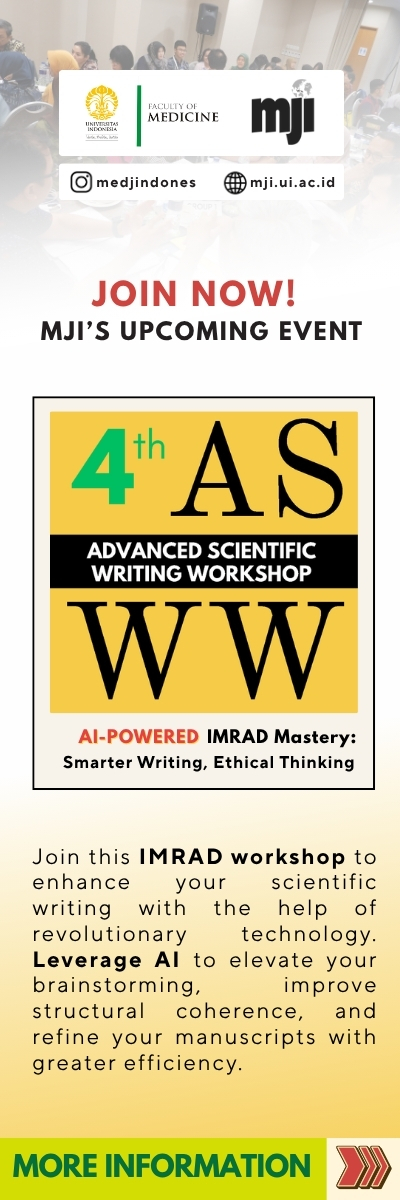Behavioral change readiness among obese adolescents in Jakarta, Indonesia
DOI:
https://doi.org/10.13181/mji.oa.236543Keywords:
adolescent, obesity, stages of change, transtheoretical modelAbstract
BACKGROUND Prochaska’s transtheoretical model of behavioral change process, consisting of stages and processes of change, should be monitored to evaluate obesity management, particularly in adolescents. Two of four processes of change are supporting relationships, which promote behavioral change, and weight management actions, which are activities that push individuals to a particular direction in patients’ weight loss progress. This study aimed to determine the participants’ current stages of change, nutritional status, and their relationship with the processes of change.
METHODS This cross-sectional study used secondary data collected in 2018 from 115 obese adolescents aged 15–21 years in Jakarta, Indonesia, using an Indonesian-translated and validated questionnaire adapted from Andrés et al’s study. The questionnaire evaluated participants’ processes of change, focusing on scores of supporting relationships (5 items) and weight management actions (10 items).
RESULTS Of the participants, 71.3% were classified as obese grade I, and 28.7% were obese grade II. Most participants were in the contemplation (31.3%) and action (31.3%) stages. The mean supporting relationships and weight management actions scores were different between participants with obese I and obese II (66.67 versus 80, p = 0.004; 64.17 versus 70, p = 0.008, respectively). Meanwhile, no differences were identified in supporting relationships and weight management actions scores in all stages of change.
CONCLUSIONS Adolescents with obesity and higher BMI (based on the obesity grading of the WHO Asia Pacific) tended to have significantly higher scores for supporting relationships and weight management actions, indicating that external reinforcement and immediate weight loss actions played pivotal roles in readiness for behavioral change.
Downloads
References
World Health Organization (WHO). Obesity and overweight [Internet]. World Health Organization (WHO); 2020 [cited 2022 Oct 11]. Available from: https://www.who.int/news-room/fact-sheets/detail/obesity-and-overweight.
Ng M, Fleming T, Robinson M, Thomson B, Graetz N, Margono C, et al. Global, regional, and national prevalence of overweight and obesity in children and adults during 1980-2013: a systematic analysis for the Global Burden of Disease Study 2013. Lancet. 2014;384(9945):766-81. https://doi.org/10.1016/S0140-6736(14)60460-8
Indonesian National Institute of Health Research and Development. Basic Health Research 2013. Jakarta: Indonesian Ministry of Health; 2013. p. 223-5.
Indonesian National Institute of Health Research and Development. Basic Health Research 2018. Jakarta: Indonesian Ministry of Health; 2013. p. 95-8.
Rachmi CN, Li M, Alison Baur L. Overweight and obesity in Indonesia: prevalence and risk factors-a literature review. Public Health. 2017;147:20-29. https://doi.org/10.1016/j.puhe.2017.02.002
Hruby A, Hu FB. The epidemiology of obesity: a big picture. Pharmacoeconomics. 2015;33(7):673-89. https://doi.org/10.1007/s40273-014-0243-x
Abdelaal M, le Roux CW, Docherty NG. Morbidity and mortality associated with obesity. Ann Transl Med. 2017;5(7):161. https://doi.org/10.21037/atm.2017.03.107
Sawyer SM, Afifi RA, Bearinger LH, Blakemore SJ, Dick B, Ezeh AC, et al. Adolescence: a foundation for future health. Lancet. 2012;379(9826):1630-40. https://doi.org/10.1016/S0140-6736(12)60072-5
Salvy SJ, Bowker JC. Peers and obesity during childhood and adolescence: a review of the empirical research on peers, eating, and physical activity. J Obes Weight Loss Ther. 2014;4(1):207.
Raj M, Kumar RK. Obesity in children & adolescents. Indian J Med Res. 2010;132(5):598-607.
Andrés A, Saldaña C, Beeken RJ. Assessment of processes of change for weight management in a UK sample. Obes Facts. 2015;8(1):43-53. https://doi.org/10.1159/000373900
Andrés A, Saldaña C, Gómez-Benito J. Establishing the stages and processes of change for weight loss by consensus of experts. Obesity (Silver Spring). 2009;17(9):1717-23. https://doi.org/10.1038/oby.2009.100
Prochaska JO, Velicer WF. The transtheoretical model of health behavior change. Am J Health Promot. 1997;12(1):38-48. https://doi.org/10.4278/0890-1171-12.1.38
Karintrakul S, Angkatavanich J. A randomized controlled trial of an individualized nutrition counseling program matched with a transtheoretical model for overweight and obese females in Thailand. Nutr Res Pract. 2017;11(4):319-26. https://doi.org/10.4162/nrp.2017.11.4.319
Herzer M, Zeller MH, Rausch JR, Modi AC. Perceived social support and its association with obesity-specific health-related quality of life. J Dev Behav Pediatr. 2011;32(3):188-95. https://doi.org/10.1097/DBP.0b013e318208f576
Johnson ER, Carson TL, Affuso O, Hardy CM, Baskin ML. Relationship between social support and body mass index among overweight and obese African American women in the rural deep South, 2011-2013. Prev Chronic Dis. 2014;11:E224. https://doi.org/10.5888/pcd11.140340
So WY, Swearingin B, Robbins J, Lynch P, Ahmedna M. Relationships between body mass index and social support, physical activity, and eating habits in African American university students. Asian Nurs Res (Korean Soc Nurs Sci). 2012;6(4):152-7. https://doi.org/10.1016/j.anr.2012.10.004
Yousif MM, Kaddam LA, Humeda HS. Correlation between physical activity, eating behavior and obesity among Sudanese medical students Sudan. BMC Nutr. 2019;5:6. https://doi.org/10.1186/s40795-019-0271-1
Lerner RM, Steinberg L. Individual bases of adolescent development. In: Lerner RM, Steinberg L, editors. Handbook of adolescent psychology: individual bases of adolescent development. 3rd ed. John Wiley & Sons Inc.; Hoboken: 2009. https://doi.org/10.1002/9780470479193.adlpsy001002
Pittman LD, Richmond A. University belonging, friendship quality, and psychological adjustment during the transition to college. J Exp Educ. 2008;76(4):343-61. https://doi.org/10.3200/JEXE.76.4.343-362
Wang M, Druker S, Gapinski MA, Gellar L, Schneider K, Osganian S, et al. The role of social support vs. modeling on adolescents' diet and physical activity: findings from a school-based weight management trial. J Child Adolesc Behav. 2014;2(2):132. https://doi.org/10.4172/2375-4494.1000132
Published
How to Cite
Issue
Section
License
Authors who publish with Medical Journal of Indonesia agree to the following terms:
- Authors retain copyright and grant Medical Journal of Indonesia right of first publication with the work simultaneously licensed under a Creative Commons Attribution-NonCommercial License that allows others to remix, adapt, build upon the work non-commercially with an acknowledgment of the work’s authorship and initial publication in Medical Journal of Indonesia.
- Authors are permitted to copy and redistribute the journal's published version of the work non-commercially (e.g., post it to an institutional repository or publish it in a book), with an acknowledgment of its initial publication in Medical Journal of Indonesia.





































